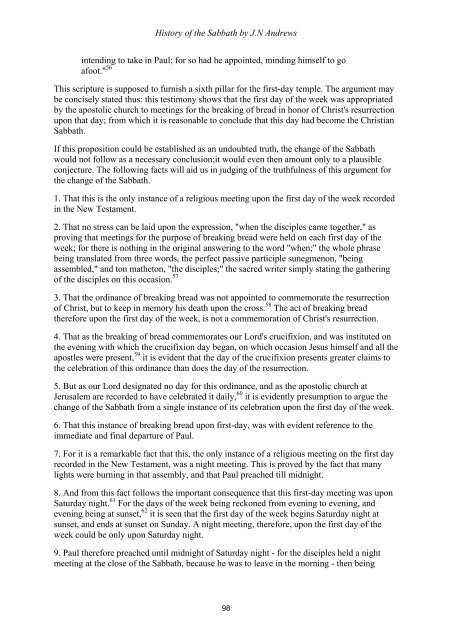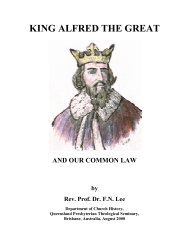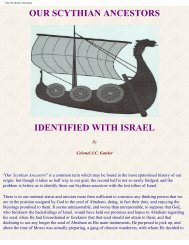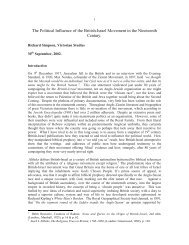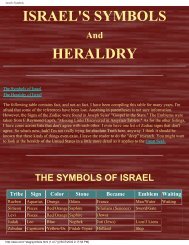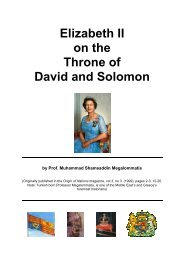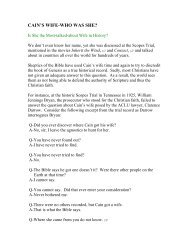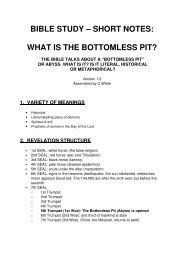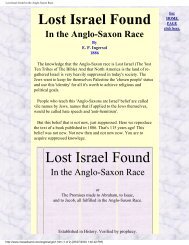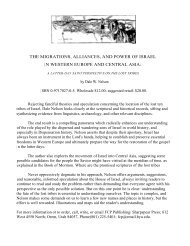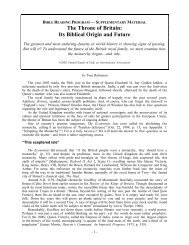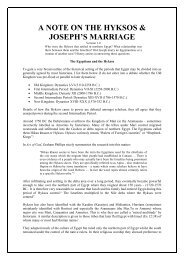HISTORY OF THE SABBATH - Friends of the Sabbath Australia
HISTORY OF THE SABBATH - Friends of the Sabbath Australia
HISTORY OF THE SABBATH - Friends of the Sabbath Australia
Create successful ePaper yourself
Turn your PDF publications into a flip-book with our unique Google optimized e-Paper software.
History <strong>of</strong> <strong>the</strong> <strong>Sabbath</strong> by J.N Andrewsintending to take in Paul; for so had he appointed, minding himself to goafoot." 56This scripture is supposed to furnish a sixth pillar for <strong>the</strong> first-day temple. The argument maybe concisely stated thus: this testimony shows that <strong>the</strong> first day <strong>of</strong> <strong>the</strong> week was appropriatedby <strong>the</strong> apostolic church to meetings for <strong>the</strong> breaking <strong>of</strong> bread in honor <strong>of</strong> Christ's resurrectionupon that day; from which it is reasonable to conclude that this day had become <strong>the</strong> Christian<strong>Sabbath</strong>.If this proposition could be established as an undoubted truth, <strong>the</strong> change <strong>of</strong> <strong>the</strong> <strong>Sabbath</strong>would not follow as a necessary conclusion;it would even <strong>the</strong>n amount only to a plausibleconjecture. The following facts will aid us in judging <strong>of</strong> <strong>the</strong> truthfulness <strong>of</strong> this argument for<strong>the</strong> change <strong>of</strong> <strong>the</strong> <strong>Sabbath</strong>.1. That this is <strong>the</strong> only instance <strong>of</strong> a religious meeting upon <strong>the</strong> first day <strong>of</strong> <strong>the</strong> week recordedin <strong>the</strong> New Testament.2. That no stress can be laid upon <strong>the</strong> expression, "when <strong>the</strong> disciples came toge<strong>the</strong>r," asproving that meetings for <strong>the</strong> purpose <strong>of</strong> breaking bread were held on each first day <strong>of</strong> <strong>the</strong>week; for <strong>the</strong>re is nothing in <strong>the</strong> original answering to <strong>the</strong> word "when;" <strong>the</strong> whole phrasebeing translated from three words, <strong>the</strong> perfect passive participle sunegmenon, "beingassembled," and ton ma<strong>the</strong>ton, "<strong>the</strong> disciples;" <strong>the</strong> sacred writer simply stating <strong>the</strong> ga<strong>the</strong>ring<strong>of</strong> <strong>the</strong> disciples on this occasion. 573. That <strong>the</strong> ordinance <strong>of</strong> breaking bread was not appointed to commemorate <strong>the</strong> resurrection<strong>of</strong> Christ, but to keep in memory his death upon <strong>the</strong> cross. 58 The act <strong>of</strong> breaking bread<strong>the</strong>refore upon <strong>the</strong> first day <strong>of</strong> <strong>the</strong> week, is not a commemoration <strong>of</strong> Christ's resurrection.4. That as <strong>the</strong> breaking <strong>of</strong> bread commemorates our Lord's crucifixion, and was instituted on<strong>the</strong> evening with which <strong>the</strong> crucifixion day began, on which occasion Jesus himself and all <strong>the</strong>apostles were present, 59 it is evident that <strong>the</strong> day <strong>of</strong> <strong>the</strong> crucifixion presents greater claims to<strong>the</strong> celebration <strong>of</strong> this ordinance than does <strong>the</strong> day <strong>of</strong> <strong>the</strong> resurrection.5. But as our Lord designated no day for this ordinance, and as <strong>the</strong> apostolic church atJerusalem are recorded to have celebrated it daily, 60 it is evidently presumption to argue <strong>the</strong>change <strong>of</strong> <strong>the</strong> <strong>Sabbath</strong> from a single instance <strong>of</strong> its celebration upon <strong>the</strong> first day <strong>of</strong> <strong>the</strong> week.6. That this instance <strong>of</strong> breaking bread upon first-day, was with evident reference to <strong>the</strong>immediate and final departure <strong>of</strong> Paul.7. For it is a remarkable fact that this, <strong>the</strong> only instance <strong>of</strong> a religious meeting on <strong>the</strong> first dayrecorded in <strong>the</strong> New Testament, was a night meeting. This is proved by <strong>the</strong> fact that manylights were burning in that assembly, and that Paul preached till midnight.8. And from this fact follows <strong>the</strong> important consequence that this first-day meeting was uponSaturday night. 61 For <strong>the</strong> days <strong>of</strong> <strong>the</strong> week being reckoned from evening to evening, andevening being at sunset, 62 it is seen that <strong>the</strong> first day <strong>of</strong> <strong>the</strong> week begins Saturday night atsunset, and ends at sunset on Sunday. A night meeting, <strong>the</strong>refore, upon <strong>the</strong> first day <strong>of</strong> <strong>the</strong>week could be only upon Saturday night.9. Paul <strong>the</strong>refore preached until midnight <strong>of</strong> Saturday night - for <strong>the</strong> disciples held a nightmeeting at <strong>the</strong> close <strong>of</strong> <strong>the</strong> <strong>Sabbath</strong>, because he was to leave in <strong>the</strong> morning - <strong>the</strong>n being98


